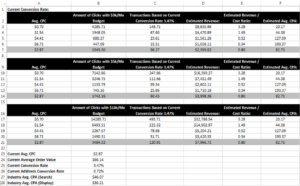Nick Noble, Director of SEO and Inbound Marketing, recently participated in a panel discussion at the Business Marketing Association’s “How to Happy Hour” event. Nick was one of four search experts on the panel discussing SEO and SEM Strategies for businesses.
Below, Nick shares insights on 10 of the most common SEO and SEM questions for building your business strategy:
1. In your experience, what separates SEO from SEM?
SEO (search engine optimization) is a part of SEM (search engine marketing). SEO is the optimization of your website in the effort to rank well organically within search results. SEM includes SEO but also includes the paid advertising strategies that appear in search results (text ads and PLA – product listing ads). The efforts of SEO focuses on organic traffic, while SEM includes all traffic from search engines.
2. What are the key benefits of implementing SEO and SEM strategies, and how can it be used to complement an overall marketing plan?
There are many benefits of implementing SEO and SEM strategies and they can not only complement, but lead an overall marketing plan. If you have a product or service that is highly searched on the internet, then search engine marketing has potential to lead your marketing efforts. In these instances, instead of trying to create the demand for your product or services, you are targeting individuals who already know they want/need your product or service and are currently looking for it.
3. When starting fresh with SEM/PPC for a company, what process do you take to build out the account structure?
Often, but not always, I start by identifying what I call the “money pages.” These are the pages that are going to send the paid traffic from our ads. They are usually product or service pages that align with the business goals. I use a single money page for individual ad groups and typically create campaigns based on the sites structure or marketing objectives (budget also plays a big role in campaign structure).
4. What are a few ongoing optimizations that could be executed within the PPC account to ensure optimal performance?
Negative keywords… Typically we are looking to reduce our CPA (cost-per-acquisition). At a consistent level of spend, two of the most effective ways to decrease your AdWords CPA are: Decrease Cost-per-Click (CPC) and Increase Conversion Rates. Read this blog post I wrote for more information on this: Two Ways to Decrease Cost Per Acquisition in AdWords.
5. Is there a difference in targeting mobile vs. desktop? How can we use that in our optimizations?
Yes. Ad text, ad extensions, landing page experience, etc. vary between mobile and desktop. Also, it important to understand the user’s intentions and experience on the different devices.
6. My company is doing a complete website redesign. What are a few things we can implement to ensure our new site is optimized for search?
Use 301 redirects! If your site URL structure is going to change on your new site then make sure you redirect your old URLs to your new URLs. These should be mapped out on a page to page basis. There’s lots more I could talk about here, so if you want to know more feel free to ask! @lookingfornoble or nnoble@parqamarketing.com
7. How do you analyze performance of your SEO and SEM efforts? What do you look for?
Depends the business objects and who you are talking to about it. Typically CEOs want to hear about revenue, leads, CPA, ROAS, etc. not traffic levels. It also can be a headache if you get them focused on things like individual keyword rankings or CTR. I should probably write a blog post on this.
8. Many times, a realistic test budget for a new account is almost always north of what a company wants to spend. How do you approach that conversation with clients or higher ups in the company? How do you determine a test budget, and what would the duration of that test be?
Do your research and use the data you have to come up with projects. This will help you validate the test budget. Here’s an example:

9. What are some free tools available for anyone looking to rank higher in Search?
Google –has multiple tools. Google analytics, AdWords keyword and display planner, Google Search Console, Google Trends, Google Page Speed Insights, Google Structured Data Testing Tool, and Google itself. A few others that can be very beneficial: SEObook, Moz/ Moz Bar, SEMrush, Raventools, Screaming Frog, etc. have limited versions or free trails. Answerthepublic.com, Keywordtool.io, ubersuggest.io are free keyword research tools.
10. What is your top tip for anyone entering the world of Search?
Always be learning – the world of search is constantly changing and evolving, therefore, as search engine marketers, we must too. Whether it’s staying up to date on the latest trends, following industry thought leaders, or learning from a past project, it is key to never stop learning. Also, be willing to test new theories and ideas and learn from their outcomes. Oftentimes, it takes creative thinking and going outside of the box to really move the needle.







